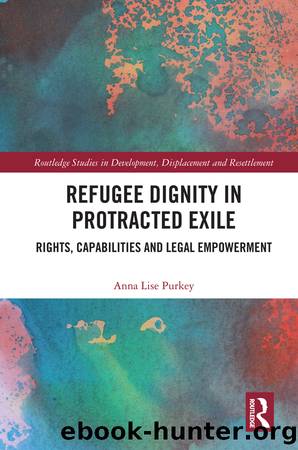Refugee Dignity in Protracted Exile: Rights, Capabilities and Legal Empowerment by Anna Lise Purkey

Author:Anna Lise Purkey [Purkey, Anna Lise]
Language: eng
Format: epub
Tags: Emigration & Immigration, Social Science, Political Science, Disasters & Disaster Relief, Law, Human Rights
ISBN: 9781000763553
Google: ifvADwAAQBAJ
Goodreads: 52888021
Publisher: Routledge
Published: 2019-12-05T00:00:00+00:00
An understanding of legal empowerment for protracted refugee situations
Drafted with the objective of addressing domestic poverty, the definitions of legal empowerment outlined by the CLEP and the Secretary General do not apply easily to protracted refugee situations. To begin with, the Secretary General refers specifically to the advancement of rights and interests âas citizens and economic actors.â70 Refugees are not citizens of the country in which they reside and so are immediately excluded from this definition, and while the reference to âeconomic actorsâ could be interpreted as an acknowledgement that what is important is what individuals can actually be and do, as opposed to what they have, it still displaces the proper focus of empowerment which should be on the rights of individuals merely as human beings regardless of their other roles. Even if one does accept (which is not proposed here) that the main focus in addressing poverty should be purely on economic activities, the same cannot be said in refugee situations. Certainly refugees may be poor, and economic initiatives may be of great use in increasing integration and self-sufficiency, but dependence on aid, as well as restrictions on employment, freedom of movement, and other rights, mean that refugees may not in fact be substantial economic actors within the host state even if they possess the potential to be so and despite increased calls for economic integration.71 Furthermore, the emphasis on property rights as one of the four main focal points of legal empowerment has much less resonance in refugee situations given their (theoretically) temporary nature.
In short, without ignoring the important role that economic activities can play in refugee assistance, what is needed is a definition of legal empowerment that is specifically tailored to the refugee context and that embodies a rights-based approach to refugee assistance. Drawing on the definitions and characteristics of legal empowerment found in the academic literature and various other reports, legal empowerment in the refugee context can be understood as the process through which refugees and refugee populations become able to use the law and legal mechanisms and services to protect and advance all of their rights and to acquire greater control over their lives, as well as the actual achievement of that increased control.
This definition has several important features, some of which are shared with other conceptions of legal empowerment and others that are more unique. First is the recognition that legal empowerment is both a process and a goal.72 It is a process through which the rights of refugees can be achieved, and it is also the actual realization of those rights, of enhanced control over their own lives and the decisions that affect them.
Second, reference to the use of law and legal mechanisms and services emphasizes that legal empowerment is not just about legislation and the formal court system. In this context law must be understood in a pluralistic and broad manner to further include regulations, administrative processes, alternative dispute resolution, traditional and/or religious justice systems, and other informal systems of communal
Download
This site does not store any files on its server. We only index and link to content provided by other sites. Please contact the content providers to delete copyright contents if any and email us, we'll remove relevant links or contents immediately.
Man-made Catastrophes and Risk Information Concealment by Dmitry Chernov & Didier Sornette(6007)
The Revenge of Geography: What the Map Tells Us About Coming Conflicts and the Battle Against Fate by Kaplan Robert D(4066)
Zero Waste Home by Bea Johnson(3833)
COSMOS by Carl Sagan(3617)
Good by S. Walden(3548)
In a Sunburned Country by Bill Bryson(3537)
The Fate of Rome: Climate, Disease, and the End of an Empire (The Princeton History of the Ancient World) by Kyle Harper(3055)
A Wilder Time by William E. Glassley(2858)
Camino Island by John Grisham(2794)
Organic Mushroom Farming and Mycoremediation by Tradd Cotter(2688)
The Ogre by Doug Scott(2679)
Human Dynamics Research in Smart and Connected Communities by Shih-Lung Shaw & Daniel Sui(2500)
Energy Myths and Realities by Vaclav Smil(2487)
The Traveler's Gift by Andy Andrews(2457)
9781803241661-PYTHON FOR ARCGIS PRO by Unknown(2365)
Inside the Middle East by Avi Melamed(2352)
Birds of New Guinea by Pratt Thane K.; Beehler Bruce M.; Anderton John C(2251)
A History of Warfare by John Keegan(2240)
And the Band Played On by Randy Shilts(2197)
